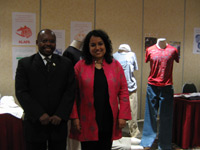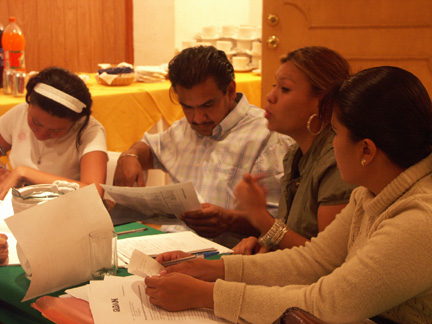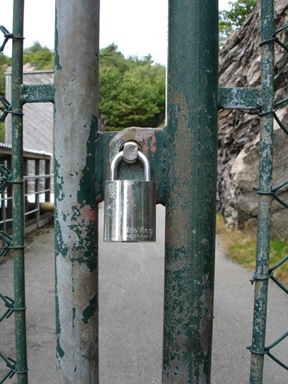WELCOME TO THE ARCHIVE (1994-2014) OF THE MAQUILA SOLIDARITY NETWORK. For current information on our ongoing work on the living wage, women's labour rights, freedom of association, corporate accountability and Bangladesh fire and safety, please visit our new website, launched in October, 2015: www.maquilasolidarity.org
Amsterdam - Following their efforts to draw attention to rights violations at an Indian garment factory, the Clean Clothes Campaign (CCC) and the India Committee of the Netherlands (ICN) were summoned to appear in a Bangalore court on June 25, 2007. The Dutch organizations, who have been raising awareness of violations at international jeans suppliers Fibres and Fabrics International and its 100% subsidiary Jeans Knit Pvt Ltd (FFI/JKPL), are accused of cyber crime, acts of racist and xenophobic nature and criminal defamation. Click here to take action now!

Ottawa has become Canada's fourth major No Sweat city. Unanimously adopted, Ottawa's Ethical Purchasing Policy is complaints-based and requires suppliers to uphold International Labour Organization (ILO) standards. It covers Ottawa's apparel and fair trade products such as coffee and tea.
 On April 16-18, representatives of major international clothing brands, apparel manufacturers, governments from developing countries, trade unions, non-governmental organizations, and the International Labour Organization (ILO) came together in Toronto for the third international meeting of the MFA Forum.
On April 16-18, representatives of major international clothing brands, apparel manufacturers, governments from developing countries, trade unions, non-governmental organizations, and the International Labour Organization (ILO) came together in Toronto for the third international meeting of the MFA Forum.
 Representatives of labour rights and women’s organizations from different regions in Mexico came together for a workshop of the Espacio network. This is the third workshop of the new network, which provides a space for the participating groups to do critical analysis and develop alternative strategies to tackle the impacts of global trade liberalization on the Mexican garment industry.
Representatives of labour rights and women’s organizations from different regions in Mexico came together for a workshop of the Espacio network. This is the third workshop of the new network, which provides a space for the participating groups to do critical analysis and develop alternative strategies to tackle the impacts of global trade liberalization on the Mexican garment industry.
On January 7, 2007, Calgary became Canada’s third major city to adopt a No Sweat purchasing policy, joining Vancouver and Toronto. The product of a lengthy effort by determined local No Sweat campaign activists, the new Sustainable Environmental and Ethical Procurement Policy now governs the City’s bulk purchases of apparel, food and chemicals.
Manitoba has become the first province in Canada to adopt No Sweat purchasing. The policy came into effect on January 1 and applies to apparel purchased in bulk by the Government of Manitoba – valued at $1.3 to $1.6 million dollars annually.
 (October 2006) As apparel brands and retailers restructure their global supply chains after the demise of the import quota system that was established under a trade agreement called the Multi-Fibre Arrangement (MFA), MSN is receiving almost daily reports from countries around the world of factory closures and massive worker layoffs. It's time to assess what companies are doing in practice, as well as what they should be doing, to live up to their responsibilities to affected workers and communities.
(October 2006) As apparel brands and retailers restructure their global supply chains after the demise of the import quota system that was established under a trade agreement called the Multi-Fibre Arrangement (MFA), MSN is receiving almost daily reports from countries around the world of factory closures and massive worker layoffs. It's time to assess what companies are doing in practice, as well as what they should be doing, to live up to their responsibilities to affected workers and communities.
(April 2006) Toronto's "Responsible Garment Manufacturers (No Sweatshops) Policy" was approved by City Council. The policy requires manufacturers of city apparel and their subcontractors to pay fair wages, respect freedom of association, women's rights and worker health and safety, and forbids the use of child labour, forced labour, excessive hours of work, and discrimination.
After three years of campaigning led by Toronto catholic school students, the Toronto Catholic District School Board (TCDSB) passed a "Sweatshop-Free Uniform Policy" February 8th which sets minimum standards for suppliers of apparel to area schools.
In 2005, senior government procurement officials from across Canada convened a “No Sweat Task Force” to consider ethical procurement. Although the Task Force was able to produce neither recommendations nor a jointly-drafted No Sweat procurement policy, it did produce an unreleased Discussion Paper. MSN obtained a copy through a recent Access to Information request.